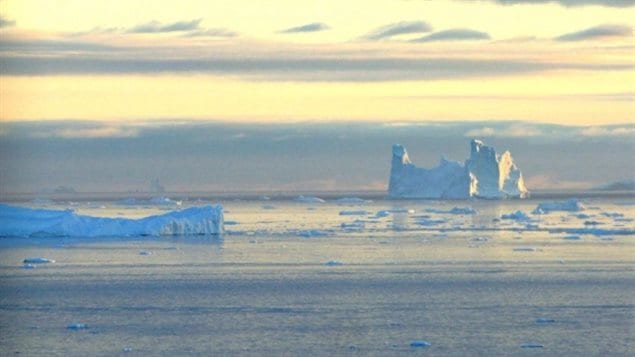Russian Geographic Entitlements
"There's a bit of temptation to thump chests over Arctic sovereignty. I would counsel the prime minister [of Canada] to simply let the process unfold in the normal way that the Russians seem to want it to."
"[The North Pole sits in darkness for three months of the year in a large and hostile ocean and is the] last place anyone will drill for oil."
Michael Byers, Arctic expert, international law professor, University of British Columbia

Jonathan Hayward / The Canadian Press Russia
has submitted its bid for vast territories in the Arctic to the United
Nations, the Foreign Ministry said Tuesday. Ice floes float in Baffin
Bay between Canada and Greenland above the Arctic circle on July 10,
2008.
Canada has indicated that it -- like Denmark which has previously declared its intention to seek United Nations recognition that its territory encompasses ownership of the North Pole -- intends to file a submission of its own, looking to enlarge its geographic scope in the Canadian claim to include the North Pole. The Canadian claim awaits additional survey work before the Canadian document is ready to be submitted to the United Nations.
Now, Russia has filed a new bid for recognition of geographic ownership of an immense swath of Arctic territory, and Russia includes in that swath the North Pole. Russia's foreign ministry spoke of a revised bid for 1.2 million square kilometres of Arctic sea shelf. Claiming the Lomonsonov Ridge represents a geological extension of the Siberian continental shelf.
 © NTV/AFP/File | A manipulator of the Mir-1
mini-submarine places a Russian state flag at the seabed of Arctic ocean
at a depth of 4,261 meters (13,980 feet) in 2007
© NTV/AFP/File | A manipulator of the Mir-1
mini-submarine places a Russian state flag at the seabed of Arctic ocean
at a depth of 4,261 meters (13,980 feet) in 2007 A claim submitted initially in 2002, but returned by the United Nations for lack of scientific verification to the claim. This new bid is the original claim fortified by what Russia claims to be "ample scientific data collected in years of Arctic research [used to back the Russian claim]". Russia even pre-empted this latest claim by symbolically planting a titanium flag on the ocean floor in 2007, taking its competitors by surprise.
All five of the countries whose territories verge on the Arctic are formalizing their claims with allowed extensions, to the United Nations under the Convention on the Law of the Sea, which permits coastal nations an extension of their jurisdiction beyond 200 nautical miles with the proviso they must prove the claimed boundary represents a natural extension. Claims to territory are then judged based on an assessment of those countries' scientific and legal proofs.
The Arctic is believed to be the repository of up to a quarter of Earth's undiscovered oil and gas resources. Rivalry among the countries concerned, Canada, Russia, the United States, Denmark and Norway is understandably self-interested, everyone anxious to claim the maximum they can prove, to advantage themselves to as large an ownership as conceivable, and with the territory, all that might be available in the geology lying on and under the ocean floor.

Canada and five other countries are using maps of the seabed to stake their claim to Arctic territory.
Photo Credit: CBC
Photo Credit: CBC
Canada has for the past several years viewed Moscow's new assertiveness on the world stage with some dismay and misgivings. Made all the more concerning as it ramped up its self-confidence under President Vladimir Putin's yearning for a Soviet renaissance and the world-power status that accompanied it, by annexing Crimea and using proxy militia rebel groups in Ukraine to contest Ukraine for its eastern borders.

Making it fairly unlikely that diplomacy on this issue will figure large between adversaries, each claiming their borders extend to ownership of contested territory. Canada has never taken military steps to take possession of another state's sovereign rights and its government would have a severe degree of difficulty approaching the Arctic claims with polite diplomatic equanimity toward a country whose globally disturbing aggression has marked it an outlier.

Labels: Arctic, Canada, Denmark, Norway, Russia, United Nations, United States

<< Home